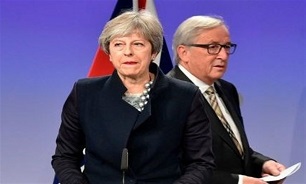EU Sets Out July 1 Deadline in Brexit Delay Plans
 The draft document, circulated to EU ambassadors on Friday and seen by the Financial Times, makes clear Britain has to take part in the May 23-26 votes if it seeks an extension of more than three months.
The draft document, circulated to EU ambassadors on Friday and seen by the Financial Times, makes clear Britain has to take part in the May 23-26 votes if it seeks an extension of more than three months.
Britain’s membership extension beyond March 29 is to be debated by EU leaders at a summit next week and European capitals disagree over the terms and length of any delay. Any decision requires the unanimous consent of 27 remaining EU leaders and the UK.
The document makes clear the legal constraints on the EU over a possible extension. It warns that EU institutions would “cease being able to operate in a secure legal context” if Britain remains in the EU after July 1 without having held elections.
The legal conclusion could help Theresa May in her efforts to persuade recalcitrant Brexiters to back her withdrawal agreement in a third vote on the deal in the House of Commons next week.
The British prime minister has warned that if her deal is rejected, the UK will need to seek a much longer extension — which would force her Conservative party into an election campaign it has no desire to fight.
“No extension should be granted beyond July 1 unless the European Parliament elections are held at the mandatory date,” the paper said. “If they are not held, the extension should terminate its effects before the European Parliament meets on 2 July.”
Jean-Claude Juncker, the European Commission president, said this week that Britain must have left the EU by May 22 if it did not want to participate in the election. But the paper focuses instead on July 2 — when newly elected MEPs are due to take their seats.
Mrs. May won overwhelming backing from the House of Commons on Thursday to ask for an extension to June 30, if she is able to secure a majority for her Brexit deal at the third time of asking.
Donald Tusk, the president of the European Council of member states, has said he will advise leaders that it may be best to give Britain a long period to “rethink” its Brexit approach. But many EU capitals are concerned about the knock-on consequences of the UK remaining in membership limbo for a prolonged period.
But beyond the “essential” obligation to hold elections, the paper makes it clear that it will be hard for other member states to apply other conditions to an extension. It says the EU treaty “does not foresee that an extension could be granted subject to special conditions expressly put on the withdrawing state”.
This may allay UK worries that, for instance, Spain will seek additional concessions on the issue of Gibraltar — a territory long disputed between Madrid and London — as a condition for approving an extension.
If there is a long extension, France is also looking to place limits on the UK’s influence during long term EU budget negotiations or the appointment of top jobs.
Separately, the paper stresses that trade negotiations with London would be impossible during the extension period, since the UK would not have left the union, scotching arguments made by some Brexiters.
This point was underlined by Michel Barnier, the EU’s chief Brexit negotiator, during the discussion with ambassadors. “As a consequence, a prolonged extension would result in a significant postponement of the opening of that [trade] negotiation,” the paper said.
The strongest conclusions in the paper concern the dangers of allowing the UK to remain a member state without meeting its obligations to hold elections.
The document argues the European Council of the bloc’s leaders should ensure the EU is not “paralyzed by the consequences of an extension”.
“All acts of the union that would be adopted with the participation of an irregularly composed parliament would be open to legal challenge on this ground, which would put the security of legal relations in the union seriously at risk, on a very large scale,” the paper concluded.
Although a second extension is possible “in principle”, the document argues that it would depend on the UK having sent MEPs to the European Parliament, as required by law.
Changing these election laws would require a treaty. “Past experience shows that ratification by all member states could require at least two years,” the officials said. “Therefore this possibility is not feasible in practice.”
Message end/
